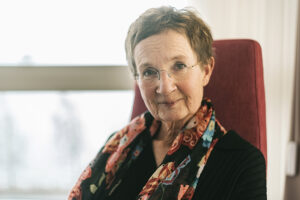
Kristina Säfsten: Meetings between human and machine
Kristina Säfsten is Professor of Production Systems at the School of Engineering, Jönköping Universi...
Read more


Meetings between research and practice
Co-production gives researchers and business actors an insight into and an understanding of each other’s needs. Both research and education can be enriched by questions and problems that have arisen in the business actors’ operations.
How it works
It is up to the universities and the business sector to determine and design how a project is co-produced, but there are some basic requirements set by the Knowledge Foundation.

Kristina Säfsten is Professor of Production Systems at the School of Engineering, Jönköping Universi...
Read more

Collaboration often leads to new ideas, new projects, and sometimes even new companies. For Sepehr M...
Read more
Co-funding from business actors
In most programmes, the Knowledge Foundation requires that the projects we fund are co-financed by the business sector. Only organizations that meet our criteria for co-financing business actors can be included as co-financiers.
Benefits for the business sector
All applications received by us are assessed based on four assessment criteria, one of which aims at the project's ability to co-produce and benefit business.